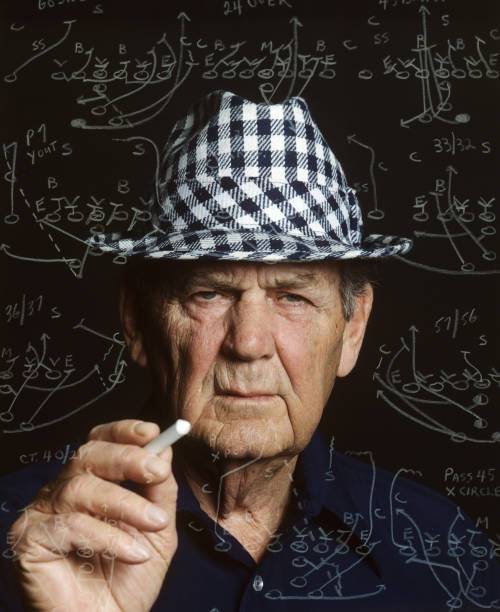STREAMING THE SECRET SAUCE: ESPN and Netflix Join Forces to Decode Bear Bryant’s Mysterious “Alabama Algorithm” in Groundbreaking Sports Docuseries
Bear Bryant. The name echoes through the halls of college football like a thunderclap frozen in time. His legacy, steeped in grit, discipline, and domination, defined an era—and arguably, created a blueprint for sustained football excellence in the Deep South. Now, ESPN and Netflix have joined forces in a once-in-a-generation collaboration to pull back the curtain on what insiders have long called the “Alabama Algorithm”—a phrase whispered by old assistants, feared by opponents, and credited for turning the Crimson Tide into a relentless dynasty. This joint docuseries promises not just a historical retelling of Bryant’s glory days but a forensic breakdown of the complex psychological, tactical, and cultural formula the legendary coach used to build an empire that still influences Alabama football to this day. And the timing couldn’t be more perfect. As the sport is reshaped by NIL money, realignment, and the transfer portal chaos, the show dares to ask: was Bear Bryant simply ahead of his time, armed with an algorithm that today’s tech-driven coaches are only now beginning to understand?
The series dives deep, taking viewers through the labyrinth of Bryant’s mind. Not just a disciplinarian in a houndstooth hat, but a methodical, calculating genius who saw football as both science and war. Through exclusive interviews with former players, coaches, rivals, and historians, the series pieces together the fragments of an unwritten code that governed everything from recruiting to play-calling, offseason conditioning to team psychology. Bryant’s insistence on mental toughness wasn’t just old-school grit—it was data before data existed. Netflix and ESPN’s production team call this a “decoded dynasty,” where every win on the field was actually engineered behind the scenes in a system so precise, it now mirrors artificial intelligence.
The phrase “Alabama Algorithm” might sound like pop-culture puffery, but to those who played under Bryant, it was real—though not necessarily mathematical. It was an all-encompassing philosophy. Players talk about how Bryant could calculate a man’s breaking point with surgical precision and push him just past it without shattering his will. The docuseries presents gripping archival footage: grainy black-and-white tapes of two-a-days in the brutal heat, players vomiting into buckets, coaches screaming into the void, and Bryant, always still, always composed—like a general in the fog of war who already knows the outcome.
One of the more haunting elements revealed is Bryant’s use of pattern recognition long before the advent of modern analytics. Assistant coaches detail how he would memorize tendencies not just of opposing teams but of individual players—down to how a lineman laced his cleats or which side of the ball a linebacker favored on third downs. There are eerie segments where Bryant, in his slow Southern drawl, predicts entire game flows before the opening kickoff, shocking even his coaching staff. What might have once been dismissed as intuition now feels like the early workings of a predictive model—a precursor to what Saban and others use today via computer algorithms and statistical models.
Recruiting, of course, was another pillar of the algorithm. But Bryant didn’t just look for stars—he looked for systems matches. He wanted rural kids who’d been through hardship, athletes with a chip on their shoulder, raw strength that could be chiseled into elegance. The docuseries uncovers Bryant’s color-coded prospect files, where notes on family background, personal tragedy, or leadership qualities carried as much weight as 40-yard dash times. The series even unearths a handwritten letter Bryant sent to a high school coach in 1974, outlining the intangible metrics he used when evaluating character and resilience. Modern coaches, including some in the NFL, were reportedly stunned by how eerily these assessments resemble the psychological profiles used in today’s combine evaluations.
What sets this docuseries apart is its unflinching commitment to complexity. Bryant is not painted as a flawless saint, nor a tyrant. The show reckons with the difficult truths too. From the slow integration of Black athletes at Alabama to the toll Bryant’s relentless standards took on his health and personal life, viewers are presented a man of contradiction. One former assistant chokes up recalling how Bryant never watched film on Sundays, not because he needed rest—but because he believed if his plan had failed, the pain would be too much to relive. His system demanded perfection, but its architect was human—brilliantly so.
The production value elevates the narrative to cinematic heights. Netflix’s storytelling mastery blends seamlessly with ESPN’s archival muscle. Scenes shift from locker room whispers to sweeping shots of Bryant-Denny Stadium, from tearful player testimonials to digitized playbooks animated like modern war maps. The pacing is deliberate but gripping—each episode peeling back another layer of the algorithm, leaving viewers breathless and hungry for the next revelation. The sound design—thundering cleats, distant whistles, Bryant’s signature gravel voice—evokes both nostalgia and awe.
The cultural relevance is unmistakable. With AI revolutionizing sports, from player performance to injury prevention, the idea that Bryant had a “human-coded” algorithm decades earlier makes the series eerily prescient. Tech experts interviewed in later episodes explain how Bryant’s methodologies align with modern decision trees and probabilistic modeling. One statistician bluntly states, “If Bear Bryant had access to today’s data tools, we wouldn’t be talking about Nick Saban as the greatest.” That kind of statement doesn’t just raise eyebrows—it challenges the very foundation of college football’s Mount Rushmore.
Bryant’s legacy has always loomed large in Alabama, but this series aims to etch his name into broader cultural granite. It turns the man behind the myth into a lens through which we can better understand football, leadership, and even the evolving relationship between man and machine. The final episode hits like a sermon. A quiet montage of Bryant walking through the mist, voiceovers from players who say his algorithm didn’t just make them better athletes—it made them better men. One ex-player, now a CEO, says, “I still use the system every day. It’s how I make decisions. It’s how I push people. Bear taught us the formula for greatness.”
In an era addicted to flash and flair, this series doubles down on essence and substance. It’s not about the touchdowns—it’s about what goes into making one happen. It’s not about the trophies—it’s about the thousand small, invisible decisions that make a program run like a machine. And perhaps most shockingly, it dares to suggest that college football’s most revered figure wasn’t just coaching players—he was engineering systems, data points, and culture in ways the sport is only now beginning to grasp.
When the credits roll on the final episode, you’re not just left with a newfound respect for Bear Bryant—you’re left with a burning question: How many dynasties today are truly built on something original, and how many are just running Bear’s algorithm with newer code?
In the end, “Streaming the Secret Sauce” isn’t just a docuseries. It’s a revelation. ESPN and Netflix haven’t just chronicled a legend—they’ve cracked his code. The “Alabama Algorithm” is no longer a whisper in Tuscaloosa. It’s a broadcast to the world. And in that unveiling, the game of football may never be the same again.



